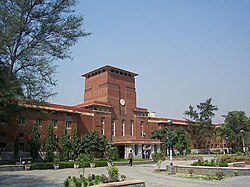This article contains promotional content .(April 2025) |
 | |
| Motto | "Dedication, Steadfastness and Truth" |
|---|---|
| Type | Law School |
| Established | 1924 |
Parent institution | University of Delhi |
| Dean | Dr. Anju Vali Tikoo [1] |
Academic staff | 130 |
| Students | 9000 |
| Address | Faculty of Law, University Enclave , , , |
| Affiliations | University of Delhi |
| Website | lawfaculty |
 | |
The Faculty of Law, University of Delhi is the law department of the University of Delhi. It has the unique distinction of producing the largest number of sitting judges of the Supreme Court of India, with many notable alumni's from various fields.
Contents
- History
- Early years
- One of the Leading Innovators in Legal Education
- Academics
- Admission
- Eligibility
- Faculty of Law - Centres
- Campus Law Center
- Law Center-I
- Law Center-II
- Pedagogy
- Case Method
- Publications
- Delhi Law Review (DLR), ISSN: 097-4936
- Journal of the Campus Law Centre (JCLC), ISSN: 2321-4716
- National Capital Law Journal, ISSN: 0972-0936
- Journal of Law Teachers of India (JOLT-I), ISSN: 2231-1580
- Delhi Law Review, Student Edition, ISSN: 0973-00IX
- Library
- Moot Court
- Legal Services Programme
- Activities
- Infrastructure
- Faculty of Law Campus
- Hostel Accommodation
- Sports Facilities
- Notable alumni
- Governors
- Judges of the Supreme Court of India
- Judges of International Supreme Courts
- Judges of High Court
- Law Officers of Government
- Politics
- Civil Servants
- References
It is situated in the north campus of the University of Delhi and has more than 130 teachers and about 10000 students at present including LL.B., LL.M., and Ph.D. students. [2]
The Faculty of Law operates through four centres within its campus, namely, Campus Law Centre, Law Centre-I, Law Centre-II and the newly-introduced 5-Year Integrated Law Course.



